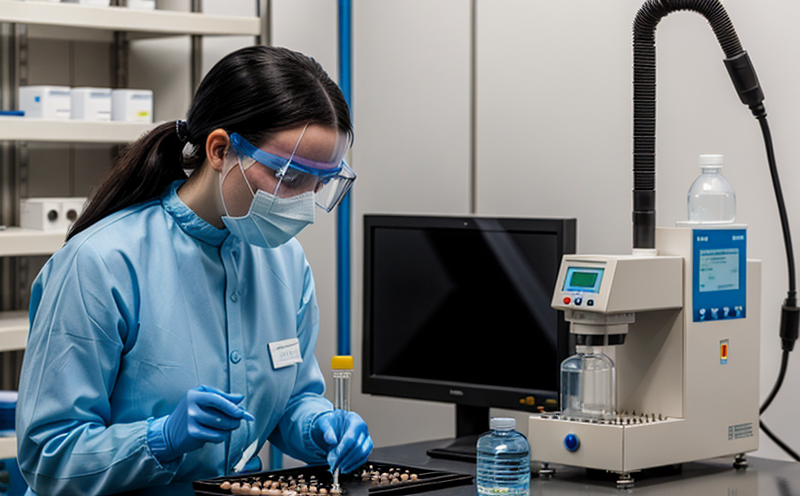ICH M7 Genotoxic Impurity Assessment Testing
The International Conference on Harmonisation (ICH) Guideline M7 provides a framework for the assessment of genotoxic impurities in pharmaceuticals. This guideline is designed to ensure that new drug applications are evaluated with respect to potential genotoxic risks, thereby protecting public health and ensuring compliance with regulatory standards.
Genotoxic impurities can cause DNA damage or mutations, which may lead to adverse effects such as cancer. The ICH M7 guideline aims to identify these impurities by specifying the conditions under which they should be tested. This includes the use of in vitro assays that measure the potential for a compound to induce chromosomal aberrations, mutagenesis, or other forms of DNA damage.
The testing process begins with a thorough evaluation of the raw materials and intermediates used in drug synthesis. Any compound identified as a potential genotoxin must undergo further analysis using sensitive detection methods such as Comet assay (single-cell gel electrophoresis), Ames test, or micronucleus test. These tests help determine whether the substance has the capability to induce genetic changes.
Once initial screening indicates that a compound may possess genotoxic properties, more detailed testing is required. This could involve in vivo studies where animals are exposed to the substance under controlled conditions. The results from these experiments provide valuable information about the likelihood of human exposure and subsequent health risks.
The data gathered during this process forms the basis for risk assessment according to ICH M7 guidelines. Based on the findings, decisions can be made regarding whether additional measures need to be taken to mitigate any identified risks. This might include implementing stricter manufacturing controls or modifying production processes to reduce contamination levels.
It is important to note that while genotoxicity testing is crucial for ensuring drug safety, it does not guarantee complete protection against all possible adverse reactions. Regulatory agencies rely heavily on such evaluations when reviewing new medications before they reach the market. By adhering strictly to ICH M7 procedures, laboratories play a vital role in safeguarding public health and maintaining high standards of pharmaceutical quality.
For researchers working within the pharmaceutical industry, understanding these requirements is essential for developing safe and effective therapeutic agents. Compliance with ICH M7 ensures that your organization meets global regulatory expectations and contributes positively to patient welfare.
Industry Applications
| Application Area | Description |
|---|---|
| New Drug Application (NDA) | Assessment of genotoxic impurities in novel drug candidates. |
| Generic Drug Approval | Evaluation of potential genotoxic contaminants introduced during manufacturing processes. |
| Biopharmaceutical Development | Detection and quantification of impurities in biologics that could impact patient safety. |
| Method Name | Description |
|---|---|
| Ames Test | Detects mutagenic effects by measuring changes in bacterial strain growth. |
| Comet Assay (Single-Cell Gel Electrophoresis) | Evaluates DNA integrity through electrophoretic migration patterns of nuclei. |
Why Choose This Test
The ICH M7 genotoxic impurity assessment test is a critical component of pharmaceutical development and manufacturing processes. By incorporating this testing into your workflow, you demonstrate commitment to patient safety and regulatory compliance.
This test offers several advantages over traditional approaches:
- Early Detection: Identifies potential genotoxic compounds early in the drug discovery process, allowing for timely intervention if necessary.
- Precision: Utilizes sophisticated analytical techniques capable of detecting even trace amounts of impurities.
- Compliance: Ensures adherence to international standards set forth by ICH, fostering trust among stakeholders and regulators.
In addition to these benefits, the test also supports continuous improvement efforts within your organization. Regularly assessing genotoxic impurities helps maintain product quality throughout its lifecycle, from initial formulation through final packaging.
By investing in ICH M7 compliant testing services, you contribute not only to your company's reputation but also to the broader goal of advancing safe and effective medicines for all patients worldwide.
Environmental and Sustainability Contributions
The ICH M7 genotoxic impurity assessment test plays a significant role in promoting environmental sustainability within the pharmaceutical sector. Through rigorous evaluation of raw materials and manufacturing processes, this testing ensures that only safe and reliable substances are incorporated into drug formulations.
This commitment to quality extends beyond just product safety; it also encompasses responsible resource management practices throughout the supply chain. By minimizing the presence of harmful impurities early in production, manufacturers can reduce waste generation and lower overall environmental impact.
Moreover, by adhering strictly to ICH M7 guidelines, companies demonstrate their dedication to sustainable business operations. This not only enhances brand reputation but also aligns with global initiatives aimed at reducing carbon footprints and promoting eco-friendly practices across industries.
In summary, the ICH M7 genotoxic impurity assessment test is an integral part of modern pharmaceutical manufacturing that supports both human health and planetary well-being. Its implementation reflects a proactive approach to innovation and responsibility, ensuring that advances in medical science are achieved without compromising environmental integrity.





